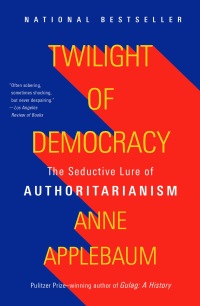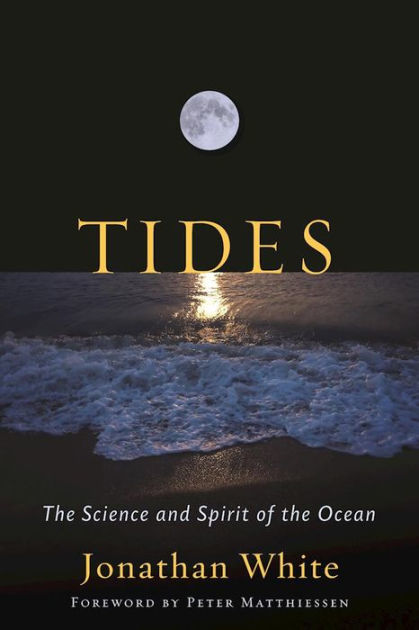Anne Applebaum, The Twilight of Democracy: The Seductive Lure of Authoritarianism

(2020: New York: Anchor Books, 2021), 206 pages including notes. No index or bibliography.
This is an important book for understanding much of what is happening in our world. However, at first, I wondered what I was getting into as Applebaum describes a party she and her husband held on New Year’s Eve 1999. She reveals her guest list and a bit about the menu. Then, as I read deeper into the book, she describes how many of those at the party went in separate directions over the next two decades. She comes back to the dinner party motif throughout the books. Parts of this book felt like a travelogue memoir as she wrote about her connection to well-known names in European politics along with meals she shared with them. But between these personal stories, Applebaum makes important observations. Conservatism has moved from its traditional Burkean views to a fascination with authoritarianism.
In the United States and the United Kingdom, the new right has broken with the old fashioned Burkean small-c conservatism that is suspicious of rapid change in all its forms. Although they hate the phrase, the new right is more Bolshevik than Burkean: these are men and women who want to overthrow, bypass, or undermine existing institutions, or destroy what exists. (page 20)
Applebaum, an American married to a Polish politician and diplomat, has lives much of her life in Britain and Poland. Once a Reagan Republican, she confesses to have left the Republican party over two issues: Sarah Palin (who kept her from supporting her hero, John McCain), and the use of torture in the war on terror. In this book, she notes how many of those she’s known through her political connections are divided over current politics within the Republican party. However, much of this book isn’t about America. She writes extensively about the politics in Poland, Hungary, the United Kingdom, and lesser degree about what’s happening in France, Spain, Italy, Brazil among other nations. I would suggest that what’s happening in these countries are important, especially since the American Conservative Union’s CPAC just held a meeting in Hungary. There, they were welcomed with wide arms by Viktor Orban, the nation’s authoritarian leader. While America is discussed throughout this book, only in the chapter “Prairie Fires” does she extensively cover what has happened in our nation in the recent past.
I recommend this book and would enjoy discussing it with others. I wished Applebaum had included an index and a bibliography. This is the second book I’ve read by her this year. In February, as it appeared there would be war in Ukraine, I read her masterful work, Red Famine. While Twilight is good, and probably pertains more to America’s future, I highly recommend Red Famine to understand what’s happen right now in Ukraine.
Here are some of my takeaways:
- Simplicity makes conspiracy theories attractive. Complexity and nuances are difficult for people to accept and understand. (see pages 45 and 106)
- The optimism of the 90s, after the end of the Cold War, has disappeared
- Conservativism has lost its optimistic views of the future (example, it no longer buys into Reagan’s “America as a shining beacon,” not as an ideal achieved, but as one to strive to live into)
- There is nothing exceptional about “American exceptionalism” as it is currently defined.
- Societies are always in a state of flux (meaning of government, national understanding of a country, etc, must constantly be redefined)
- As we move beyond COVID, the future is not clear. Can democratic ideals be revigorated or will we move toward authoritarian institutions? (pages 185-186)
- Although it is difficult work, we must still strive for “apathy” is deadening, “mind-numbing,” and “Soul-destroying.” (!87).
Shawn D. Wright, Theodore Beza: The Man and the Myth

(Great Britain: Christian Focus Publication, 2015), 256 pages. Discussion questions after each chapter. No notes, bibliography or index.
Theodore Beza was John Calvin’s successor in Geneva after the Reformer’s death. Wright wrote this book to refute a popular notion that Beza moved away from Calvin’s teaching as he took the Reformed movement into a more scholastic direction. While I am not convinced that Wright succeeded with his stated purpose, he introduces Beza to a new generation by outlining his life and his major theological positions. For this reason, I am glad to have read Wright’s work.
Like Calvin, Beza was French. Unlike Calvin, who died long before the St. Bartholomew’s Day massacre (1572), Beza’s Geneva had a front row seat to the autocracies committed upon the Protestants in France. This troublesome event, along with living through plagues, certainly colored Beza’s worldview.
From what I understand from Wright, Beza had a more vivid “eschatology vision” than Calvin. But, as I just pointed out, his ministry was in a different era. Furthermore, from how Wright presents Beza theology, it appears that the younger pastor in Geneva spent more time dealing with “double predestination” than Calvin. It also appears he wrote more about hell, Satan, and the reprobate than Calvin. Having not actually read Beza, I’m not sure I can state this categorically, but from my reading of Wright, it appears this way. While Calvin certainly accepted the idea of double predestination as a means to maintain God’s sovereignty, I don’t remember him dealing with the topic as much as Wright suggests Beza did.
There were several insights into Beza’s thought I found useful. His four differences between law and gospel are helpful distinctions. He begins noting that law is natural while gospel is supernatural (91). Beza also appears to have been pastoral in his theology. This was seen in both his work on a Christian response to the plague and in his writings on prayer. I wish I had read the section on plague before COVID, as it could have been very helpful. He makes the case for doing what we can to protect ourselves and our families as well as acknowledging God’s role in all.
If you’re into theology, I recommend this book. Otherwise, I might look at my next book.
Jonathan White, Tides: The Science and Spirit of the Ocean

Don Waren, narrator (2017: Audible, 2017), 11 hours 12 minutes.
While I really enjoyed this book, I’m not sure how to catalog it. It’s part travelogue, as White travels to globe to experience various tide phenomenon. It’s part historical narrative as the author discusses various understandings to tide theory, from the ancient world myths to the present. There’s a part of the book that is an astrological primer, as we learn of the moon and sun’s role in creating tide. But in addition to the pull heavenly bodies, there’s also a discussion of the role of geology, wave theory, and how vibration (resonance) effects tides. And after explaining tide theory, Write discusses ecological issues and how tides can help provide power (as it once did in England where it powered many mills around the seacoast).
A researcher provided the author an example of how tides slosh around the ocean. It’s not all uniform as if the ocean is a pan where the water moves back and forth, from one side to the other. Instead, it’s like having a table full of pans. When someone kicks the leg of the table, the water in each pan sloshes at different rates. Because of other factors like geology, the ocean doesn’t act uniform with the gravity pull of the sun and moon. Some places experience great tides while other places (especially nearer the equator or in lakes), the tides are barely noticeable.
I learned many things from this book including that spring tides have no relationship to the season, but to an old Anglo-Saxon word that means “to rise or swell or bust.” Spring tides generally occur at New or Full Moons. The opposition, which occur seven days later, are “neap tides.”
Having grown up near the coast in North Carolina, I’ve been aware of tides my whole life. But the coast in North Carolina has only a tide that averages 3 feet. I also knew that in South Florida, the tides were much less. When I moved to Savannah, I was shocked to realize that its tides were much higher than those to the north or south (the spring tides often being over 10 feet). Sadly, Wright does not discuss the tides within the blight (indention) along the Georgia coast that creates larger tides by forcing in more water. While he writes about using tide for energy, he doesn’t mention the way rice farmers would use a series of locks and dikes around the coast tidal rivers to flood fields. This practice was done in the American South, and was probably brought into use by the slaves who learned such skill along the African coast.
A ten-foot tide might seem to be a lot, but there are places in the world where tides can be as high as 50 feet! Another interesting phenomenon are tidal bores. Wright travels to the Qiuntang River in China to explore the “Silver Dragon,” a tidal wave that rushes up the river. In another chapter he goes under the ice in the Canadian arctic with an Inuit elder to hunt mussels. With extreme low tides, the natives supplemented their diet by forging under the ice, but they had to be careful to exit the ice caves before they were filled with water. In addition, he explores surfing off California and Hawaii and his own sailing in some of the tidal straits that can be challenging when caught at a time when the tide is running fast.
Toward the end of the book, he discusses climate change, sea-level rise, and such dangers posed to coastal areas. He visits the Scotland’s Orkney Islands and South Chili to learn about using tides to generate electricity. Interestingly, John Kennedy spoke about using tides in New England to create electricity just weeks before his death. Kennedy said:
“The problems of the world cannot possibility be solved by skeptics and cynics whose horizons are limited by the obvious realities. We need people who can dream of things that never was.”
I enjoyed listening to this book and recommend it to anyone interested in the sea.

Wow. I think I need to read the Applebaum book. Thanks for bringing it to my attention.
I’d love to hear your take on it.
Thanks for your great reviews, Jeff! Now I have two more books to buy: “Tides…,” of course! As someone who knows the Bay of Fundy well and am very familiar with tidal bores and huge changes in depths of water and as a geologist, I can’t resist this one. And “Red Famine.” I need to read this book. Terry just showed up to leave for the second AVs game, so this hockey fan has to go. I’ll be back to continue catching up! Take care!
You had an incredible game to watch last night, Louise! Congratulations. I think you’ll like Tides.
Regarding Twighlight of Democracy, I’m curious to know if any of it covered the polarization of just about every facet of today’s society. I long to see more cohesiveness in what is seemingly become a more fractured nation.
She talked about polarization, especially among families and former colleagues, but her research mostly focused on how right-wing authoritarian moves are gaining popularity in Europe and the US.
I enjoyed reading your takeaways from the first book. I suspect there are many reasons that people are drawn to conspiracies. And my husband thinks that Trump’s initial appeal was his extremely simple slogans.
I think his appeal runs deeper. Sadly, everyone uses simple slogans these days, regardless of which side of the debate one is on. We seem to have become a soundbite society.
These sound like three very interesting books. I’ll definitely look out for Tides, as I’m very interested in the sea (and already have a couple of books on the topic sitting on my pile of books to read.)
I think you’ll enjoy “Tides.” In addition to learning about how tides work, his writing is engaging. And he spends some time in Scotland!
What a varied selection! Surprisingly (given I normally avoid politics), the first one sounds quite interesting to me.
I have appreciated her writing in “The Atlantic” for some time. She is very articulate and it is interesting how similar things are going on around the globe.
Interesting books. Managing mankind is exceedingly difficult, isn’t it. God’s gift of ‘free will’ might have been a curse! I do continue to be optimistic about our chances though yesterday day challenging and I can’t listen to the news anymore.
“Managing mankind…” Interesting term that goes with one of the books I am currently reading, Arthur Herman’s “The Light and the Cave.” I’ve just gotten though chapters on Plato’s “Republic” (which I spent a lot of time with in college when I took a semester long class on it) and Aristotle’s “Politics” (which I’ve not read).
Those ancient Greeks were awfully clever. That’s when Democracy was pure. Didn’t work, but Plato’s world was a great petrie (sp?) dish.